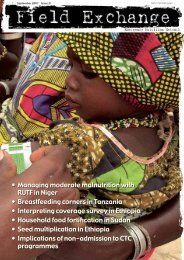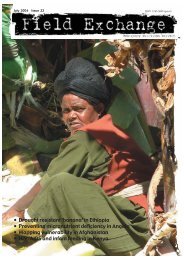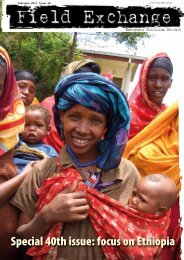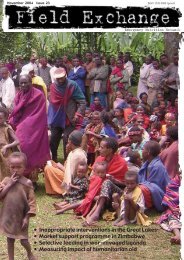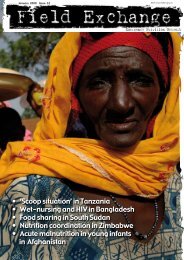Download a PDF of this issue - Field Exchange - Emergency ...
Download a PDF of this issue - Field Exchange - Emergency ...
Download a PDF of this issue - Field Exchange - Emergency ...
You also want an ePaper? Increase the reach of your titles
YUMPU automatically turns print PDFs into web optimized ePapers that Google loves.
News<br />
En-net update,<br />
March-May 2012<br />
By Tamsin Walters, en-net moderator<br />
Thirty-six questions were posted on en-net in the three months<br />
March to May inclusive, eliciting 176 replies. In addition 25 job vacancies<br />
were posted.<br />
Recent discussions have included: Mid Upper Arm Circumference<br />
(MUAC) changes in pregnancy and ongoing research into what are the<br />
most appropriate thresholds to use for pregnant and lactating mothers<br />
in programmes to treat acute malnutrition and how they correlate<br />
with adverse outcomes, dilemmas <strong>of</strong> whether to use weight-forheight<br />
or MUAC to diagnose acute malnutrition and the potential<br />
biases <strong>of</strong> the two measures in different population groups, the challenges<br />
inherent in attempting causal analyses <strong>of</strong> acute malnutrition,<br />
and considerations <strong>of</strong> how to continue to promote breastfeeding in<br />
community-based management <strong>of</strong> acute malnutrition (CMAM)<br />
programmes.<br />
An interesting discussion arose from a situation in Somalia where<br />
reports came in <strong>of</strong> mothers “starving” their children in order to benefit<br />
from nutritional treatment and a protection ration being provided<br />
alongside programmes to treat acute malnutrition. This is not an unfamiliar<br />
scenario and has been reported in several countries, with<br />
greater or less emphasis, in many programmes implemented in crisis<br />
situations. The Nutrition Cluster in Somalia is trying to gather further<br />
evidence to establish how significant and widespread the problem is.<br />
Meanwhile, performance monitoring data from one programme in<br />
Somalia has shown an increase in relapses in the last three months<br />
from 8% to 17%, which could be linked to the same <strong>issue</strong>. Suggestions<br />
and solutions were sought on how to address <strong>this</strong> situation.<br />
Discussants advised enhancing community mobilisation and counselling<br />
for both mothers and fathers, as well as engaging other<br />
influential community leaders. Contributors cited successful examples<br />
<strong>of</strong> both individual counselling as well as group discussions in<br />
programmes in Uganda, South Sudan, Ethiopia, Niger, Haiti and<br />
Bangladesh.<br />
Despite these examples <strong>of</strong> successful approaches to address the<br />
immediate <strong>issue</strong>s, it was agreed that ‘starving’ <strong>of</strong> children was most<br />
likely symptomatic <strong>of</strong> a much greater underlying problem <strong>of</strong> food<br />
insecurity. “These are usually decisions made under conditions <strong>of</strong> real<br />
stress which aid workers, agencies, donors and planners have never<br />
personally faced and <strong>of</strong>ten to not consider” 1 .<br />
A situation where people are taking such desperate measures to<br />
access basic commodities suggests a large unmet need in terms <strong>of</strong><br />
general rations and basic household food needs. It is a survival strategy<br />
for the family.<br />
Excerpts from a letter from Nelson Mandela on World Food Day,<br />
September 2004, was quoted to bring home the real <strong>issue</strong>s people are<br />
facing and the decisions they are making in such situations:<br />
"Hunger is an aberration <strong>of</strong> the civilized world... Families are torn asunder<br />
by the question <strong>of</strong> who will eat. As global citizens, we must free children<br />
from the nightmare <strong>of</strong> poverty and abuse and deprivation. We must<br />
protect parents from the horrifying dilemma <strong>of</strong> choosing who will live. 2 "<br />
The discussion concluded with a consensus that mothers should<br />
never be shamed or punished in nutrition programmes, but efforts<br />
should be made to understand and help them. Mothers do not harm<br />
their children unthinkingly; they are facing desperate life and death<br />
decisions for their families. Our work is to try to understand and<br />
respect the reality <strong>of</strong> their day to day lives and adjust our programmes<br />
accordingly to meet their needs.<br />
To view the full discussion, go to<br />
http://www.en-net.org.uk/question/717.aspx<br />
To join any discussion on en-net, share your experience or post a<br />
question, visit www.en-net.org.uk<br />
Contributions from Fortune Maduma, Martha N, Peris Mwaura, Yara<br />
Sfeir, Chantal Autotte Bouchard, Mark Myatt, Leo Anesu Matunga, Alex<br />
Mokori, Michael Golden, Nikki Blackwell and others.<br />
MAMI-2 research<br />
prioritization<br />
– call for collaborators<br />
In January 2010, the report <strong>of</strong> ‘The Management <strong>of</strong> Acute Malnutrition in<br />
Infants aged



